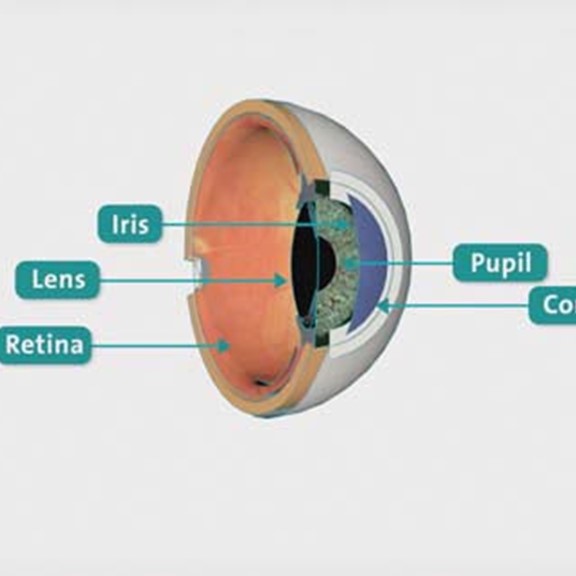Cataract removal surgery
Improve blurred vision caused by cloudy areas on the lens of the eye.
We offer the latest surgical techniques to remove cataracts and improve eyesight, helping you to get back to everyday activities.
Sometimes also called
- Phacoemulsification
At a glance
-
Typical hospital stay
A few hours -
Procedure duration
1 hour -
Type of anaesthetic
Local -
Available to self-pay?
Yes -
Covered by health insurance?
Yes
Why Spire?
- Fast access to diagnostic tests and scans
- Direct booking
- Flexible visiting hours
- Clear, inclusive pricing
What is cataract surgery?
Cataract surgery involves replacing a cloudy lens in your eye with a clear artificial lens to improve vision. Cataracts occur when the lens in your eye becomes cloudy causing blurred vision which can impact your everyday activities such as:
- Working
- Driving
- Reading
Cataract surgery is most often carried out on people over 65, although some medical conditions can cause cataracts earlier. It's a very successful treatment to help improve your vision. Some people still need to wear glasses after cataract surgery.
It's a very successful treatment to help improve your vision. The benefits of cataract surgery include:
- Seeing things in focus
- Reduced glare from bright lights
- Distinguishing between colours easier
Cataract removal surgery can also benefit you by allowing you to resume your everyday activities and improve your quality of life. Most people still need to wear glasses after cataract surgery to carry out some tasks at least.
What are cataracts?
The lens is a transparent disc that sits behind the coloured part of your eye (iris). It focuses light to the back of your eye (retina) and helps you to see clearly and sharply. As we age, the cells in the lens form cloudy patches – these are called cataracts. The cataracts prevent light getting to the back of your eye and so your vision becomes blurry and cloudy. Usually, cataracts will get worse over time and your consultant may recommend surgery to remove them.
Find your nearest Spire hospital or clinic
Most Spire hospitals offer private cataract surgery and have teams of ophthalmologists (eye doctors) who specialise in this procedure. Cataract removal surgery may also be offered at one of our Spire Healthcare Clinics.

How cataract surgery works
For the operation, your surgeon will put some drops in your eye to widen your pupil and relax your eye muscles. You'll also be given a local anaesthetic. Once the anaesthetic is working, your surgeon then makes a small incision (cut) to the front of your eye (cornea) and removes the damaged lens. This is usually done by ultrasound to break up your lens into small fragments to remove it easily (phacoemulsification).
Your natural lens is then replaced by an artificial one. This is known as an intraocular lens (IOL) and is measured for your eye before surgery using a process called biometry. Your surgeon will usually leave your eye to heal naturally without stitches.
After you’ve recovered from surgery, you won’t be able to feel the new IOL as it becomes a permanent part of your eye, requiring no additional care. A range of IOLs are available to suit different lifestyle and vision needs.
Different types of intraocular lenses
- Monofocal lens – have a fixed focus, usually for distance vision meaning you’ll need to use reading glasses
- Multifocal lens – similar to bifocal glasses, this type of lens allows both near and distance vision, which may reduce dependency on glasses after surgery
- Accommodating lens – move slightly when looking at near objects allowing a range of focusing power similar to multifocal lenses
- Toric lens – if you have astigmatism, these can reduce it to improve your vision
Your consultant will advise which IOL is best for you.
An alternative laser-assisted surgery, sometimes called ReLACS or FLACS, has demonstrated positive results in many trials. However, the studies that have assessed the outcomes of laser-assisted surgery have mostly used toric or monofocal intraocular lenses (IOLs), so the effectiveness with multifocal lens implantation isn’t as well documented. You should speak to your consultant for advice on the best type of surgery for you.
When to have cataract surgery
There's no right time and your consultant will take into account the effect your loss of vision is having on your everyday life. Many patients choose not to wait too long. See your optician or GP for a referral, or find your nearest Spire hospital or clinic.
If you have cataracts in both eyes, your consultant will probably recommend you have cataract surgery in one eye at a time, to give it time to heal before having the second eye treated.
Cataract removal surgery
Watch how cataract removal surgery takes place
View transcript of this video
This animation explains what happens during a cataract. Cataract surgery involves replacing the cloudy lens inside your eye with an artificial one to improve vision. Cataracts occur when the lens in your eye becomes cloudy, causing blurred vision.
Let's take a closer look. The lens of the eye is a clear, transparent disk that sits in its own capsule behind your pupil.
It focuses light that passes through to the back of your eye, the retina, helping you to see clear, sharp images. If you have a cataract, the lens inside your eye becomes cloudy. For the operation, your surgeon will put some drops in your eye to widen your pupil and relax your eye muscles.
You'll also be given a local anaesthetic. Once the anaesthetic is working, a small incision is made to the front of your eye, the cornea, to remove the damaged lens. This is usually done by ultrasound to break up your lens into small, removable fragments.
A new, artificial lens is then inserted. This is known as an "interocular lens," and is measured for your eye before surgery using a process called "biometry." There are different types of interocular lenses, and your consultant will advise which is best for you.
Your surgeon will usually leave your eye to heal naturally without stitches. Cataract surgery lasts less than one hour, and you should be able to go home the same day. Your eye may look red and bruised at first, but this will disappear after a few days. Some people may experience blurred vision for some time after surgery.
This is because your eye needs to recover and adjust to the new lens. Your consultant will tell you when you can have your eyes tested again. For more information, contact your local Spire Hospital or visit the Spire Healthcare website.
What to expect during cataract removal surgery
Preparing for cataract removal surgery
Before surgery, you’ll have a pre-operative assessment. Your eye will be examined using a process called biometry to take measurements that will help your ophthalmologist decide what type of IOL you’ll need. You’ll be asked about any previous eye surgery and your general health will also be assessed at this appointment.
Most cataract surgery is performed under local anaesthetic, which means you can eat or drink as normal before and after the operation. If you’re having general anaesthetic, you’ll be asked not to eat or drink anything for around two hours before the operation.
Your ophthalmologist will also advise you whether you should stop taking or adjust any medications you’re taking.
How long does cataract surgery take?
Cataract surgery is a relatively straightforward procedure that takes less than one hour and you should be able to go home the same day.
Anaesthetic
You'll be given a local anaesthetic either as eye drops or an injection before the procedure so you shouldn’t feel anything. Afterwards, there may be some mild discomfort for a few days.
Who’ll be involved?
Your ophthalmologist and usually a nurse will be present during your procedure.
Your nurse may administer the anaesthetic and eye drops to make your pupil dilate. They’ll also clean your eye and the surrounding area before your operation.
Your ophthalmologist will conduct the operation once your eye is numb and your pupil is dilated.
After cataract removal surgery
At the end of the operation, your nurse or ophthalmologist may cover your eye with a dressing, an eye pad or a shield. You may also be given eye drops to use at home to prevent infection and/or reduce swelling. Make sure you use them as instructed.
You’ll be able to go home a few hours after surgery – as soon as you feel ready and your ophthalmology team are happy and have given you advice on how to care for your eye at home. If you have a dressing, it should be left in place overnight and you should be able to remove it the next day. You’ll probably need to wear a plastic shield at night for a week or more to protect it while sleeping.
You’ll need to arrange for someone to drive you home from the operation and you should be seen by your ophthalmologist for a check up before driving again.
Recovering from cataract removal surgery
Recovery time
You may notice the difference in your eyesight almost immediately – for instance, colours might appear brighter.
However, for many people, vision is blurry for 10 to 14 days after cataract surgery as your eye recovers and adjusts to the new lens. You should be able to stop wearing your eye patch or shield at night a week or two after the operation. In four to six weeks, you should be fully back to normal.
If you have an existing eye condition, side effects may be more likely.
Short-term side effects
After cataract surgery, it’s normal to experience blurred or double vision, grittiness, redness or watering. This should all settle after a few days.
Using glasses
You may still need glasses after cataract surgery, particularly if you needed them before. Your consultant will tell you when you can have your eyes tested – usually after about 6 to 12 weeks.
What you should/shouldn’t do after cataract surgery
You can perform most daily tasks, such as bathing, showering, reading, watching TV or using a computer. However, avoid swimming, strenuous exercise or housework and don’t drive until your ophthalmologist says so.
Ensure that you use your eye drops as instructed and wear your eye patch at night and while washing your hair for at least a week. Don’t allow soap or shampoo into your eye and you should also avoid eye make-up for at least four weeks.
Risks and complications of cataract surgery
Most people have cataract surgery without complication, but all surgery carries risks and your consultant will explain this to you before you decide to go ahead.
Cataract surgery complications include:
- Bleeding
- Drooping eyelid
- Eye infection
- Glaucoma
- Inflammation
- Lens dislocation
- Loss of vision
- Retinal detachment
- Secondary cataract
- Swelling
- Tearing of the supporting capsule behind the lens
Some people may experience posterior capsule opacification (PCO) many years after cataract surgery. This means that the capsule that holds the lens has become cloudy. Treatment to correct this is usually by laser and is quick and painless to perform.
At Spire Healthcare, your safety is our top priority. We have high standards of quality control, equipment and cleanliness and an ongoing system of review and training for our medical teams.
Treatment and recovery timeline
Although everybody’s different and you should always follow your consultant’s advice, here’s a typical recovery timeline for cataract surgery:

1 week
Any eye pain, redness or itching should go
7-14 days
Stop wearing eye shield at night
10-14 days
Clear eyesight restored
4-6 weeks
Fully back to normal
-
1 week
Any eye pain, redness or itching should go
-
7-14 days
Stop wearing eye shield at night
-
10-14 days
Clear eyesight restored
-
4-6 weeks
Fully back to normal
Frequently asked questions
How long does cataract surgery last?
Intraocular lenses (IOLs) are designed to last for many years so you shouldn’t need to replace them. A cataract operation should only need to be done once in each eye.
How soon can I drive after cataract surgery?
Your ophthalmologist will advise you when you can drive again, so always check with them first. You’re fit to drive when your vision meets DVLA standards, which may mean waiting for new glasses. You can get your eyes tested at six to 12 weeks after your operation. You'll also need to wait until you've fully recovered from the anaesthetic and ensure you're not taking any pain medication that could make it unsafe for you to drive.
How long does it take to recover from cataract surgery?
In four to six weeks, you should be fully back to normal with no side effects.
How long after cataract surgery is vision blurry?
Your vision may be blurry for seven to 10 days after surgery.
Can vision still change after cataract surgery?
Generally, your vision shouldn't deteriorate after cataract surgery (unless you develop another condition, such as glaucoma). Your close vision will continue to decline naturally with age. However, some people experience posterior capsule opacification (PCO) which causes cloudiness or blurred vision. This can be treated with laser surgery to make your vision clear again and doesn’t usually cause long-term problems.
What can you not do after cataract surgery?
You should avoid swimming, strenuous exercise or housework and don’t drive until your ophthalmologist says so. Don’t allow soap or shampoo to into your eye and you should also avoid eye make-up for at least four weeks.
The treatment described on this page may be adapted to meet your individual needs, so it's important to follow your healthcare professional's advice and raise any questions that you may have with them.
Get in touch
Sources
https://www.nhs.uk/conditions/cataracts/ https://www.nhs.uk/conditions/cataract-surgery/recovery/
http://www.rnib.org.uk/eye-health/your-guide-cataracts/when-should-i-have-cataracts-surgery
http://www.rnib.org.uk/campaigning-current-campaigns/eye-health
https://www.nice.org.uk/guidance/ng77/chapter/recommendations#referral-for-cataract-surgery
https://www.rcophth.ac.uk/wp-content/uploads/2014/12/2010-SCI-069-Cataract-Surgery-Guidelines-2010-SEPTEMBER-2010-1.pdf
https://www.rnib.org.uk/eye-health-eye-conditions-z-eye-conditions/cataracts-laser-treatment-following-cataract-surgery


